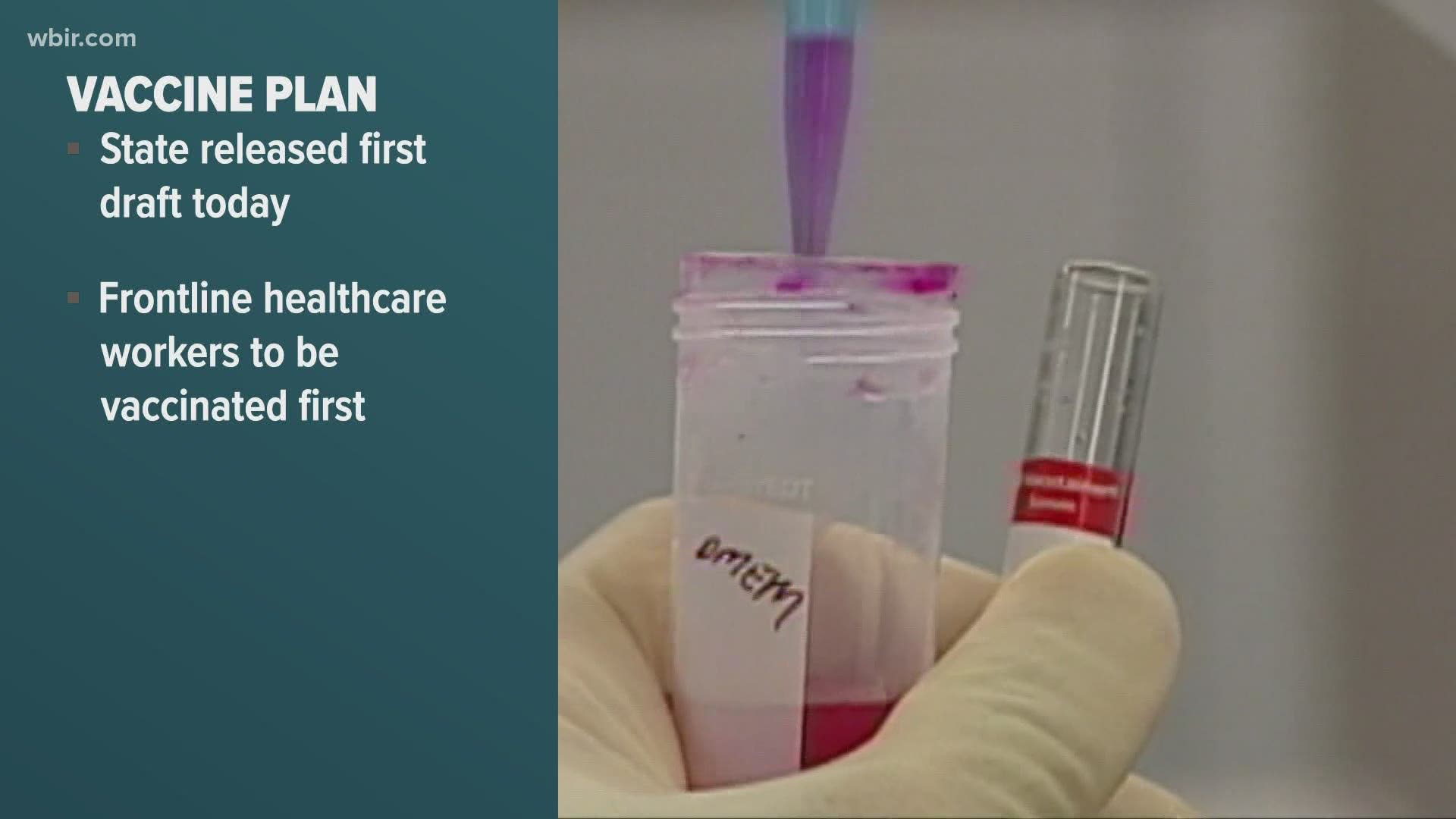NASHVILLE, Tenn. — The Tennessee Department of Health released the first draft of its COVID-19 vaccine distribution plan Wednesday as the nation waits for phase three trials to reveal an effective vaccine.
TDH Commissioner Dr. Lisa Piercey said this plan is still "very fluid" and will almost certainly change once a vaccine is approved.
“I would be super surprised if this doesn’t change before we are done with this,” she said. "Keep in mind this is not a be-all, end-all document. It is living and breathing.”
Tennessee Immunization Program Medical Director Dr. Michelle Fiscus said a vaccine will not be distributed until one is deemed completely safe and effective through the phase three clinical trials currently underway. She said she cannot overstate the importance of having these vaccines.
"There has never been a time in history where we have been able to achieve herd immunity without a vaccine,” she said. "It is critical to get participation from the public if we want to get out of the cycle of COVID illness."
The initial plan to distribute vaccines is still admittedly murky, as it's unknown what type of vaccine will be approved, which populations it will be approved for, or precisely how many will be available to the state. TDH has developed a general plan based on its recent experience with statewide influenza immunization programs, saying this experience will put the state in a good position when COVID vaccines can be distributed.
TDH said the Centers for Disease Control will notify the state precisely how many vaccines it will received at first.
Currently, Tennessee is slated to receive 2% of the vaccines allocated nationally, but those vaccines may not arrive all at once. The state is planning on a scenario where there is a slow "trickle" or spurts of vaccines in the first weeks/months.
Once the state has enough vaccines in hand, it said it plans to allocate the distribution so that 5% are provided equitably to all 95 counties, 85% are distributed based on county population, and 10% are retained by the state for situations where it would need stock on hand to respond to critical needs, such as vaccine wastage/shortfalls in areas with many people vulnerable to the illness.
Once vaccines are distributed to counties, then the priority for who gets them first will be allocated in phases -- which the state hopes to move through quickly as more vaccines are made available. TDH said populations identified by the CDC's Social Vulnerability Index and framework outlined by the National Academies of Sciences, Engineering and Medicine will be used to determine priority in this order generally:
First Phase:
1. Frontline COVID-19 Health Care Workers/first responders frequently exposed to COVID-19
2. Outpatient Health Care Workers
3. Patients with high-risk comorbidities such as diabetes and heart/lung problems, and older adults in long-term care facilities
Second Phase:
4. K-12 and child care staff, those with moderate-risk comorbidities, people in congregate care settings at greater risk for infection (prisons, mental health facilities, homeless shelters), older adults, critical infrastructure workers
Third Phase:
5. Young adults, children and industry workers
Fourth Phase:
6. Everyone else
Dr. Fiscus said pediatric vaccines for younger children under 12 years old will take longer, as they require separate trials to determine if they are safe. At the moment, she believes pregnant women and young children are off the table for receiving a vaccine in the first round into the foreseeable future until those trials begin. Children age 12 to 17 may also be excluded depending on the results of the current phase three trials.
You can read the current draft of the plan submitted to the CDC below or at this link:
Currently, the state said well over 1,000 health providers across the state have volunteered to provide the vaccine in the first wave. The state is vetting providers to determine which are most capable to widely administer the vaccine to priority patients, saying hospitals will take first priority, and then pharmacies.
Fiscus said the state will not be considering past history of COVID-19 infections to determine who receives a vaccine, as she said research is showing people who recover from an infection do not retain any lasting immunity to COVID-19 beyond a few months.
Even with vaccines widely distributed, she said COVID-19 will be around for the foreseeable future, though its health risk to people will be greatly mitigated much like the many yearly strains of flu.
"We will continue to see this virus for years, if not decades or longer,” she said.
At the current pace of trials, Fiscus said she's hopeful COVID vaccines will be widely available to everyone by mid-2021.

